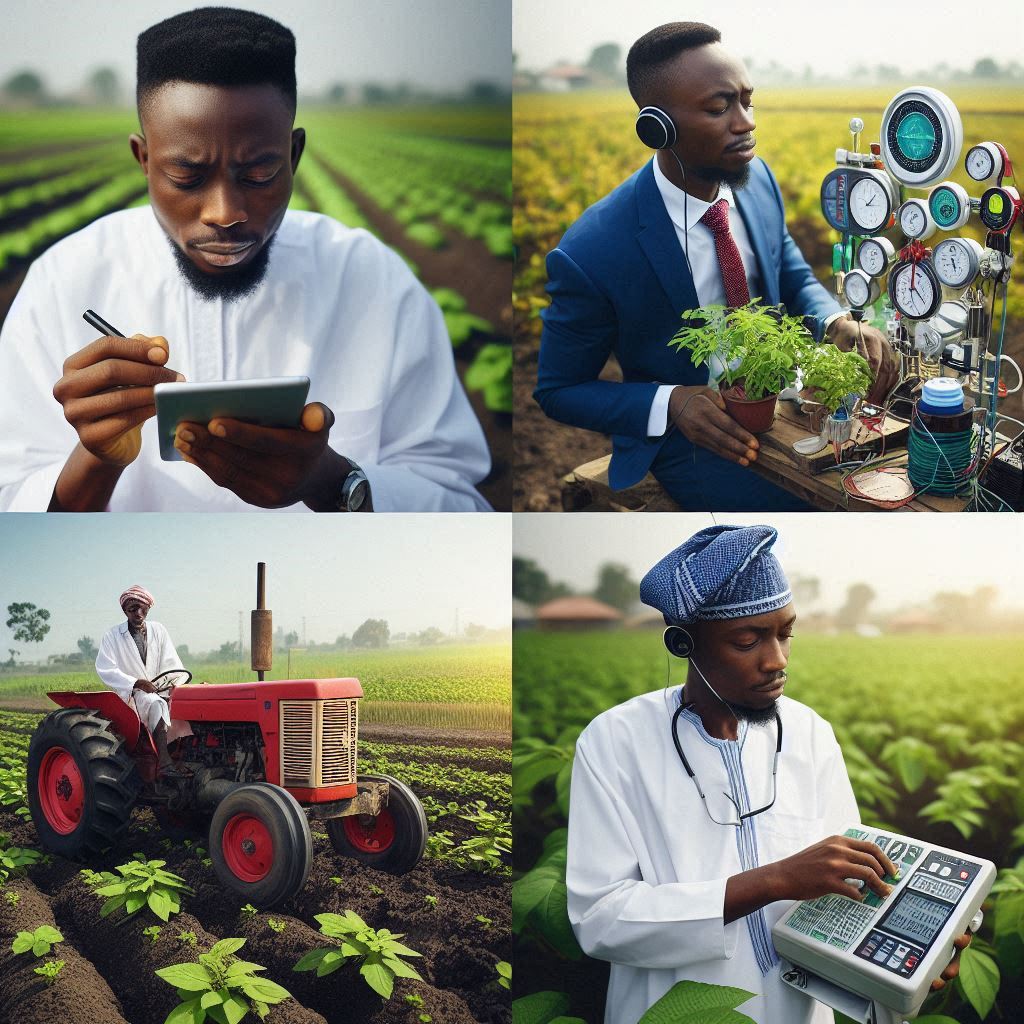Introduction
Fieldwork and practical training play pivotal roles in shaping the landscape of Nigerian agriculture, serving as cornerstones for experiential learning and skill development.
In Nigeria, where agriculture serves as a crucial pillar of the economy, the importance of hands-on experience cannot be overstated.
These immersive experiences provide aspiring agriculturalists with invaluable insights into the complexities of farming practices, offering a practical complement to theoretical knowledge.
Through fieldwork, individuals gain firsthand exposure to the nuances of agricultural processes, from soil management to crop cultivation and livestock husbandry.
This direct engagement fosters a deeper understanding of the environmental, social, and economic factors that influence agricultural outcomes in Nigeria.
Furthermore, practical training equips farmers with the necessary tools and techniques to navigate the challenges inherent in Nigerian agriculture, from climate variability to market dynamics.
By honing their skills through hands-on experience, individuals are better prepared to innovate and adapt to changing agricultural landscapes, thereby contributing to the sector’s growth and resilience.
In essence, fieldwork and practical training serve as catalysts for the development of a skilled and knowledgeable agricultural workforce in Nigeria, capable of driving sustainable change and prosperity within the sector.
Overview of Nigerian Agriculture
Significance of Agriculture in Nigeria’s Economy
Nigeria’s economy heavily depends on agriculture, contributing significantly to the country’s GDP and employing a large portion of the population.
Agriculture serves as a major source of revenue for Nigeria, providing food security, raw materials for industries, and export opportunities.
The sector also plays a crucial role in reducing poverty, enhancing rural development, and supporting economic growth in the country.
Types of Crops and Livestock Commonly Grown and Raised in Nigeria
Crops
- Cassava: One of the most important staple crops in Nigeria, used for food, animal feed, and industrial purposes.
- Maize: Widely grown across Nigeria for human consumption and animal feed.
- Rice: Nigeria is one of the largest rice producers in Africa, with both upland and lowland varieties cultivated.
- Yams: A popular tuber crop in Nigeria, used for various culinary purposes.
Livestock
- Cattle: Raised for beef, milk, and hides, with both traditional and commercial production systems in place.
- Poultry: Dominant in Nigeria’s livestock sector, with chickens, turkeys, and ducks raised for meat and eggs.
- Sheep and Goats: Valuable sources of meat, milk, and hides, playing a crucial role in the country’s livestock industry.
- Fish: Nigeria has a thriving aquaculture sector, with catfish, tilapia, and carp being the primary fish species farmed.
By understanding the importance of agriculture in Nigeria’s economy and the various crops and livestock grown and raised in the country, fieldwork and practical training in Nigerian agriculture become essential for enhancing productivity and sustaining the sector’s growth.
Read: Online Courses in Curriculum Studies Nigeria
Importance of Fieldwork in Agriculture
Why fieldwork is crucial for students studying agriculture
Fieldwork stands as a cornerstone for students studying agriculture, offering unparalleled experiential learning opportunities.
It bridges the gap between classroom knowledge and real-world application, providing invaluable insights into the practical aspects of agricultural practices.
How fieldwork helps in understanding practical aspects of agriculture
In Nigeria, where agriculture plays a significant role in the economy, the importance of fieldwork cannot be overstated.
Students studying agriculture benefit immensely from engaging directly with agricultural activities in the field.
This hands-on experience fosters a deeper understanding of the complexities and challenges faced by farmers in Nigeria.
Fieldwork enables students to apply theoretical concepts in a practical setting, reinforcing their learning and enhancing retention.
By actively participating in activities such as soil sampling, crop cultivation, and livestock management, students gain firsthand experience that cannot be replicated in a classroom.
Moreover, fieldwork offers students the opportunity to observe and analyze agricultural practices in real-time.
They witness the impact of environmental factors, such as soil type and climate, on crop growth and productivity.
This observational learning helps students develop critical thinking and problem-solving skills, essential for addressing challenges in Nigerian agriculture.
Additionally, fieldwork fosters a sense of connection to the land and the agricultural community.
Students develop a deeper appreciation for the hard work and dedication required to sustainably manage agricultural resources.
They also gain insight into the socio-cultural aspects of farming practices, learning from the wisdom and experience of local farmers.
Read: Tech-Enhanced Learning in Nigerian Schools
Practical Training Opportunities in Nigerian Agriculture
When it comes to gaining practical training in agriculture in Nigeria, there are numerous programs and institutions that offer hands-on experience to students.
These opportunities are essential for budding farmers and agricultural enthusiasts looking to gain real-world knowledge and skills in the field.
Existing Programs for Practical Training
- National Youth Service Corps (NYSC): The NYSC program provides graduates with the opportunity to serve in rural areas and engage in agricultural activities.
- Agricultural Development Programs: Many states in Nigeria have agricultural development programs that offer practical training to individuals interested in farming and agribusiness.
- Vocational Training Centers: These centers, both government-run and private, offer courses and workshops in various aspects of agriculture, providing hands-on training to participants.
Reputable Institutions and Organizations
- International Institute of Tropical Agriculture (IITA): IITA is a renowned research institution that offers practical training and research opportunities in agriculture.
- Federal College of Agriculture: Various federal colleges of agriculture across Nigeria provide practical training programs for students pursuing agricultural studies.
- Agricultural Development Projects: Organizations like the World Bank and the Food and Agriculture Organization (FAO) often collaborate with Nigeria on agricultural development projects that offer training opportunities.
These institutions and organizations play a crucial role in equipping individuals with the necessary skills and knowledge to thrive in the agricultural sector.
By participating in practical training programs, students not only gain hands-on experience but also network with industry professionals and experts, enhancing their career prospects in agriculture.
Read: Nigerian Curriculum Studies Academic Journals

Learn More: Funding Options for Business Education Students
Challenges Faced During Fieldwork and Practical Training
Common obstacles faced by students during fieldwork in Nigerian agriculture
Fieldwork in Nigerian agriculture presents students with various challenges, hindering their learning experiences.
One common obstacle is inadequate resources, including tools and equipment, which can impede students’ ability to conduct experiments or carry out practical tasks effectively.
Additionally, students often encounter logistical challenges, such as transportation issues or limited access to agricultural sites.
These logistical hurdles can disrupt fieldwork schedules and limit students’ exposure to diverse agricultural practices.
Furthermore, safety concerns pose a significant challenge during fieldwork.
Students may face risks associated with handling machinery, working in unfamiliar environments, or encountering wildlife.
Without proper safety protocols in place, students’ well-being may be compromised, impacting their ability to fully engage in practical training.
Address possible solutions to overcome these challenges and make the most out of the training
To address resource constraints, stakeholders must prioritize investment in educational resources for agricultural training programs.
This includes providing adequate funding for the procurement of tools, equipment, and materials necessary for fieldwork activities.
Collaborating with industry partners and leveraging technology can also help mitigate resource shortages and enhance students’ learning experiences.
Logistical challenges can be addressed through careful planning and coordination.
Establishing partnerships with local agricultural organizations or farmers’ cooperatives can facilitate access to agricultural sites and transportation arrangements.
Additionally, incorporating virtual field trips or remote learning opportunities can supplement on-site training, allowing students to explore different agricultural settings without logistical constraints.
Safety protocols should be integrated into fieldwork training programs to ensure students’ well-being.
This includes providing comprehensive safety training sessions, equipping students with appropriate personal protective equipment, and implementing emergency response procedures.
Regular safety inspections and risk assessments can help identify potential hazards and mitigate risks before they escalate.
Moreover, fostering a culture of collaboration and support among students and instructors can enhance the overall fieldwork experience.
Encouraging peer-to-peer learning and mentorship opportunities can help students navigate challenges more effectively and build resilience in the face of adversity.
Essentially, while fieldwork and practical training are invaluable components of agricultural education in Nigeria, they are not without challenges.
By addressing resource constraints, logistical hurdles, and safety concerns, stakeholders can create an enabling environment for students to maximize their learning experiences and develop the skills necessary for success in Nigerian agriculture.
Read: Curriculum Studies Student Resources in Nigeria
Benefits of Fieldwork and Practical Training
List the advantages of gaining practical experience in agricultural practices
Gaining practical experience in agricultural practices offers numerous benefits for students in Nigeria.
Firstly, it provides them with hands-on exposure to real-world farming techniques, allowing them to apply theoretical knowledge in practical settings.
Secondly, fieldwork enables students to develop essential skills such as crop management, soil analysis, and livestock handling.
These skills are critical for success in the agricultural sector and are best learned through direct experience.
Additionally, practical training fosters a deeper understanding of the complexities of Nigerian agriculture, including the impact of environmental factors and socio-economic dynamics on farming practices.
Moreover, fieldwork cultivates problem-solving abilities as students encounter and overcome challenges encountered in the field.
This encourages critical thinking and innovation, essential qualities for future agricultural leaders.
Furthermore, hands-on experience in agricultural practices instills a sense of responsibility and stewardship towards the environment and natural resources.
Students learn about sustainable farming methods and the importance of preserving biodiversity and ecosystem health.
How fieldwork can enhance students’ skills and knowledge in agriculture
Through fieldwork, students have the opportunity to engage directly with agricultural processes, from planting and harvesting crops to caring for livestock.
This practical experience deepens their understanding of agricultural techniques and best practices.
Fieldwork also exposes students to a variety of agricultural environments and production systems, broadening their knowledge base and preparing them for diverse career opportunities in the agricultural sector.
Moreover, hands-on experience allows students to develop practical skills that are in high demand within the agricultural industry.
These skills include operating farm machinery, conducting experiments, and implementing agricultural technologies.
Additionally, fieldwork encourages collaboration and teamwork among students as they work together to complete tasks and solve problems.
This fosters communication skills and interpersonal relationships, which are essential for success in any professional setting.
Furthermore, fieldwork provides students with opportunities for networking and mentorship within the agricultural community.
By interacting with farmers, researchers, and industry professionals, students gain valuable insights and guidance that can shape their future careers.
Most importantly, fieldwork and practical training are essential components of agricultural education in Nigeria, offering students numerous benefits.
From gaining hands-on experience to developing practical skills and expanding their knowledge base, fieldwork enhances students’ readiness for success in the agricultural sector.
Find Out More: Overview of Biology Education in Nigerian Schools
Conclusion
In this section, we’ve delved into the vital role of fieldwork and practical training in Nigerian agriculture.
We’ve highlighted how these hands-on experiences offer aspiring agricultural professionals invaluable insights and skills.
Throughout the discussion, it became evident that fieldwork bridges the gap between theory and practice, providing students with a deeper understanding of agricultural processes.
We explored the benefits of gaining practical experience, including the development of essential skills like crop management, problem-solving, and teamwork.
Furthermore, we emphasized the significance of hands-on experience in preparing students for the complexities of the agricultural sector in Nigeria.
Aspiring professionals need more than just classroom knowledge; they require practical skills and real-world experience to thrive.
In the end, by prioritizing fieldwork and practical training, we can ensure that future agricultural leaders in Nigeria are well-equipped to address challenges, drive innovation, and contribute to the sustainable growth of the agricultural industry.




